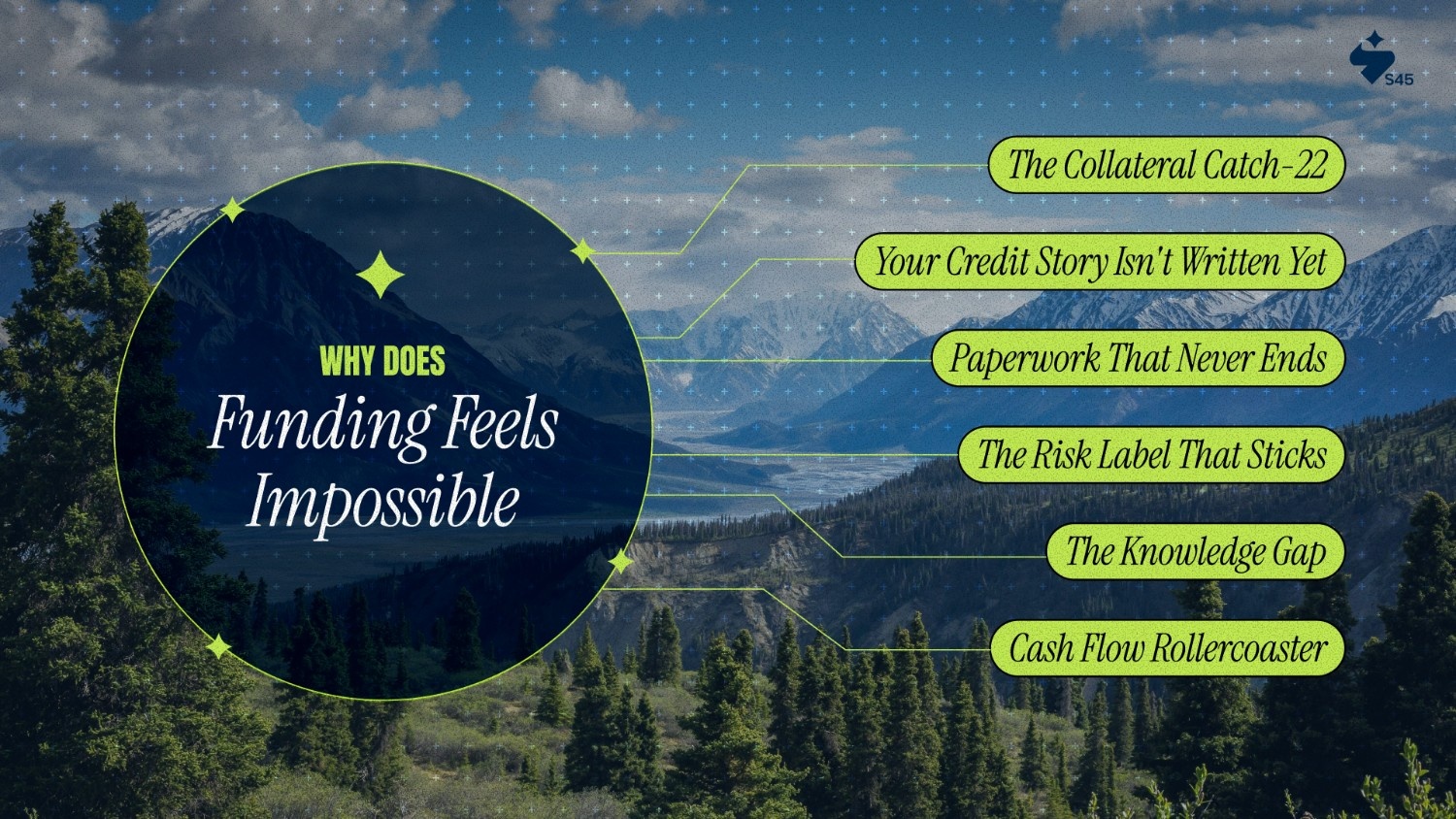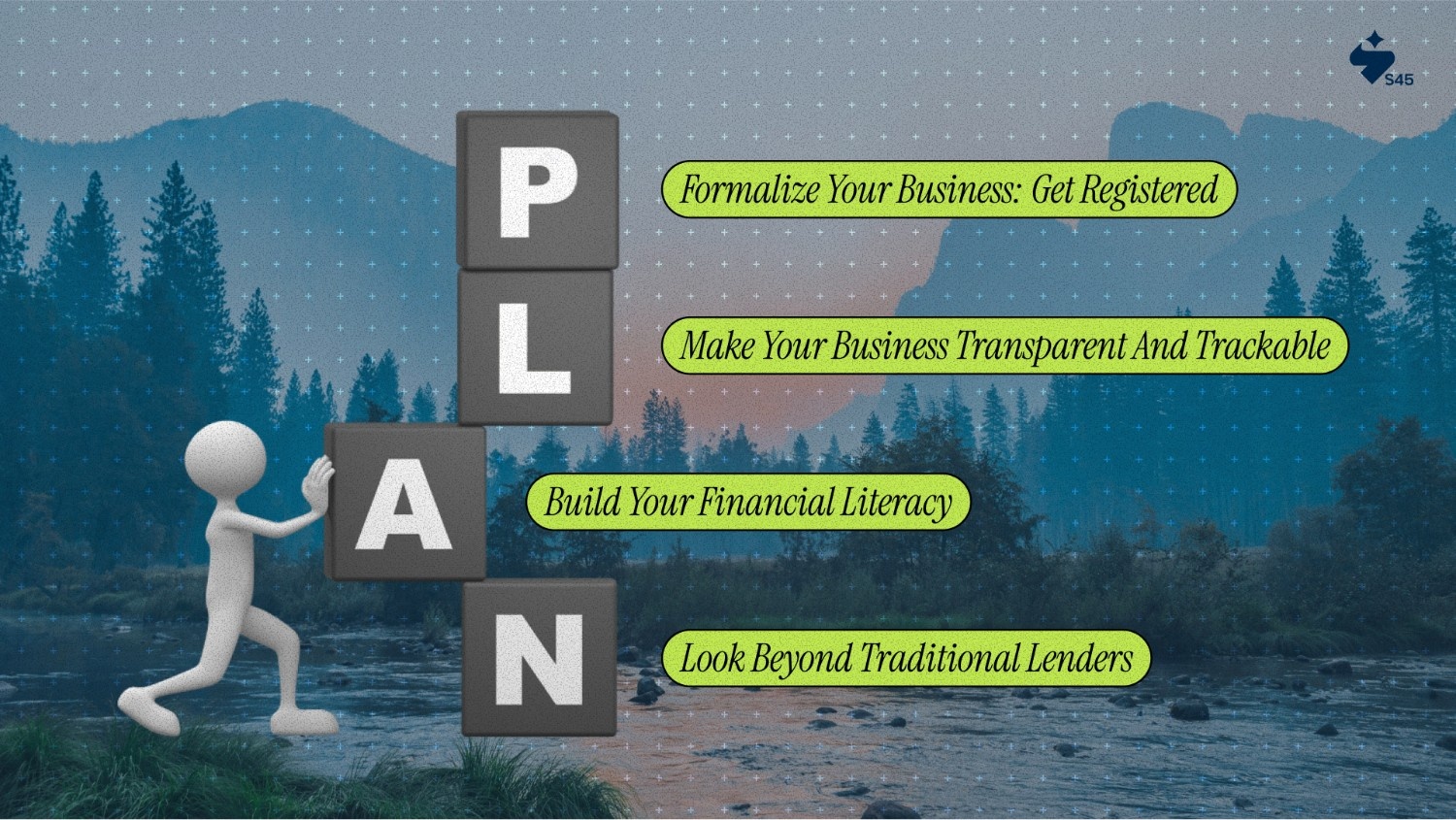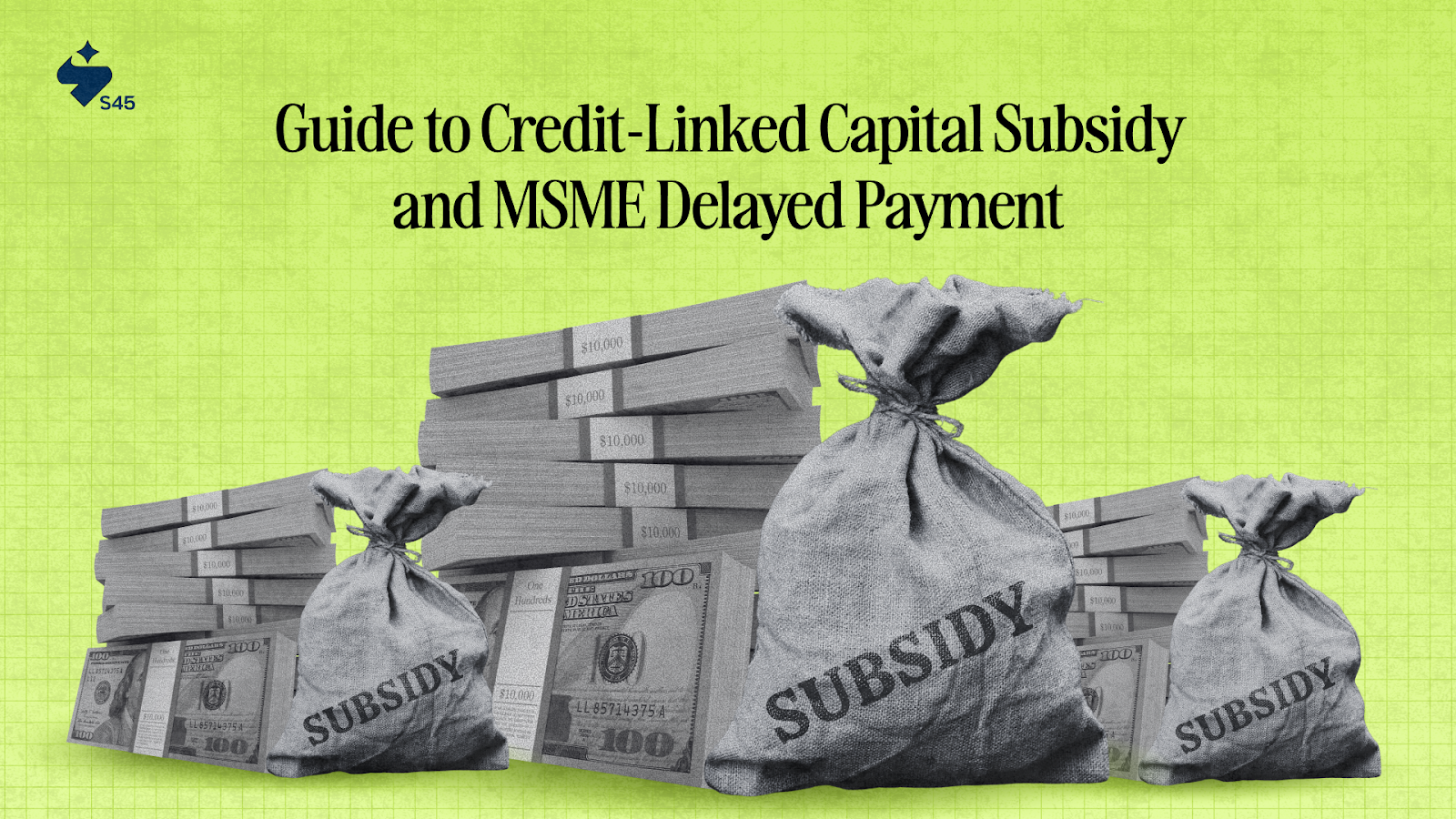
Key Takeaways
- Indian MSMEs face a ₹30 lakh crore credit gap. Banks demand collateral, endless paperwork, and treat small businesses as "high-risk”.
- Cash flow gaps from delayed payments, complex compliance requirements, and banks that focus on property ownership rather than actual business performance.
- Government schemes like PMMY (₹20 lakh without collateral), fintech platforms using your business data instead of property, and specialized funding options for different founder needs.
- Your next steps are, register with Udyam, digitize your accounting, and build multiple funding relationships.
- You can partner with S45 Club for strategic guidance beyond just capital—because sustainable growth needs more than money.
As a founder, you already know that money is the fuel that keeps your business running. But here's what might surprise you: despite SMEs contributing nearly 30% to India's GDP and employing over 110 million people, accessing that fuel remains one of the biggest headaches for business owners like you.
The numbers tell a stark story. A 2024 SIDBI report reveals that Indian MSMEs face a credit gap of around ₹30 lakh crore. That's not just a statistic—it represents countless sleepless nights for founders worrying about cash flow, missed growth opportunities, and the constant stress of keeping operations afloat.
If you've ever felt frustrated by bank rejections, overwhelmed by paperwork, or stuck in a cash flow crunch, you're not alone. Let's break down why funding feels like an uphill battle and, more importantly, what you can do about it.
Why Does Getting Funding Feel Like Climbing Mount Everest?

You have a solid business idea, paying customers, and growth potential, yet banks are reluctant to treat your loan application. As a founder, you're dealing with challenges that go beyond simple loan rejections. These are systemic issues that affect how you run your business every single day.
Here's why this happens and what it means for your day-to-day reality:
- The Collateral Catch-22: Banks want security before they lend, but most of us started our businesses without owning prime real estate or having family jewels to pledge. You're stuck in a loop: you need money to grow your assets, but you need assets to get money.
- Your Credit Story Isn't Written Yet: Unlike established corporations with decades of financial records, your business might be relatively new. Banks see "limited credit history" and immediately think "risky bet." It doesn't matter that you've been paying your suppliers on time or that your customers trust you—without a formal credit trail, you're starting from zero.
- Paperwork That Never Ends: The stack of documents, the multiple visits, the "just one more form" requests? This isn't just inconvenient, it's a productivity killer. While you're running between bank branches, your competitors are focusing on growing their business. Strategic solutions like S45 support the founders, helping navigate these complexities so you can focus on what you do best.
- The Risk Label That Sticks: Banks have labeled small businesses as "high-risk," which translates to higher interest rates or outright rejections. It's frustrating because you know your business inside out, but they only see you through the lens of statistics and risk models.
- The Knowledge Gap: Many of us started businesses because we're great at what we do. But financial planning, understanding credit options, and navigating government schemes? That's a different skill set entirely, and banks expect you to master it overnight.
- Cash Flow Rollercoaster: Your biggest client pays in 90 days, but your supplier wants payment in 30. Sound familiar? This timing mismatch creates a cash crunch that makes banks nervous and keeps you awake at night worrying about meeting payroll.
Now that we've acknowledged these pain points, let's dig deeper into the new solutions designed specifically for the challenges affecting your business right now.
At S45, we've learned that the most successful founders aren't necessarily the ones who know everything, but those who know when and where to get the right guidance.
How Modern Solution for SME Financing Moved Beyond Traditional Lending?
The traditional lending system wasn't built for businesses like yours, but that's changing fast. Let's look at the solutions that are already helping founders overcome these challenges.
Government Support That's Finally Accessible
The government has launched several initiatives to bridge the financing gap for MSMEs, helping businesses scale and grow sustainably:
- Pradhan Mantri Mudra Yojana (PMMY): Provides micro-credit up to ₹20 lakhs for non-farm enterprises, without requiring traditional collateral. It's specifically designed for founders who are tired of being rejected by traditional banks.
- Raising and Accelerating MSME Performance (RAMP): A World Bank-supported scheme that helps MSMEs access:
1. Credit
2. Technology
3. Market opportunities
These initiatives are crucial for empowering businesses to expand and thrive in competitive markets.
Technology That Gets Your Business
The most exciting changes are coming from fintech companies that understand your challenges because they were built specifically to solve them.
- Niyogin & Oxyzo: They provide unsecured loans. They look at your actual business performance, your sales patterns, customer payments, and growth trends. This means you can get approved based on how well you're already doing, not what you own.
- Embedded Finance & Supply Chain Financing:
1. Provide access to working capital immediately when you deliver goods and services. The lender gets paid when your customer pays.
2. Eliminate the need for physical collateral, ensuring more inclusive financing options.
These aren't future concepts. They're available now and helping founders just like you solve their immediate cash flow challenges.
Specialized Financing: A More Inclusive Future
As the need for specialized financing grows, these emerging solutions offer fresh opportunities:
- Gender Finance:
1. Women-led MSMEs face a $158 billion credit gap.
2. Microloans and women-focused credit lines are being introduced to address this disparity.
- Sustainable (Green) Finance:
1. Focuses on supporting MSMEs adopting eco-friendly practices.
2. A key area for future growth, providing financing for businesses committed to sustainability.
These solutions are paving the way for more inclusive and sustainable financing opportunities for MSMEs.
But knowing about these solutions is just the first step. Let's talk about what you can actually do starting tomorrow.
Your Action Plan: Steps You Can Take This Week

Reading about solutions is one thing, but implementing them is what will actually change your situation. Here's your practical roadmap for improving your access to funding.
- Formalize Your Business: Get Registered! Registering your business with Udyam can help you access government schemes and build a formal credit history. This will strengthen your relationship with lenders and improve your financing prospects.
- Make Your Business Transparent and Trackable: Adopt digital accounting and payment systems to create a clear, verifiable data trail. By doing so, you can use alternative data sources for credit scoring, improving your chances of securing financing.
- Build Your Financial Literacy: Improving your financial literacy will help you make better business decisions. Take advantage of government-run training and skill development programs to gain a deeper understanding of business management and finance.
- Look Beyond Traditional Lenders: Expand Your Funding Options. Don’t limit your financing options to traditional banks. Explore fintech platforms that offer flexible, collateral-free loans tailored to the unique needs of MSMEs. These platforms provide an easier and faster way to access the capital you need.
At this point, you might be thinking: "This all sounds good, but how do I actually execute this while running my business?" This is where having the right partnership becomes crucial.
S45: Why Expertise Matters for a Sustainable Legacy
Securing capital is just the first step. For a business to achieve sustainable growth, you need more than just a financial injection. You need a partner who understands your vision and provides the strategic expertise to help you scale.
This is where the S45 can help you thrive.
- Legacy Through Innovation: We believe true legacy is built through innovation, not quick wins. Our goal is to help you create a lasting business.
- Walk Beside, Never Above: We don’t just invest; we partner with you. We’re in your corner, providing both financial capital and strategic guidance to help you navigate the complexities of scaling your business.
- Community of Climbers: We foster a collaborative network where founders can share insights, overcome challenges, and celebrate successes together. It's about collective growth.
- Trust as Currency: Our relationships are built on transparency and shared success. We believe trust is the foundation for a strong, long-term partnership.
- Sustainable Summit: Our focus is on long-term, gradual growth that is both purposeful and profitable. We're here to help you build a business that can go the distance.
If you're ready to move beyond the frustrations of traditional financing and partner with people who are committed to your long-term success, let's connect!
FAQs
1. What are the key tax and budget benefits introduced for MSMEs in India?
The government has introduced several tax benefits for MSMEs. Businesses with annual revenue under ₹50 crores now pay a reduced tax rate of 22%. The ceiling for presumptive taxation has increased, easing the tax burden. The government has also raised the threshold for GST registration and offered a 15% investment allowance on new plant, machinery, and equipment to encourage growth.
2. What are the specific documents required to apply for an MSME loan?
To apply for an MSME loan, lenders typically ask for recent passport-size photographs, proof of business address (rent agreement or utility bill), bank statements from the last six months, and Income Tax Returns (ITR). A certificate of business establishment and KYC documents like PAN or Aadhaar cards are also required for identity verification.
3. What are the different loan categories under the Pradhan Mantri Mudra Yojana (PMMY)?
PMMY provides micro-credit in four categories:
- Shishu: Loans up to ₹50,000
- Kishore: Loans from ₹50,001 to ₹5 lakhs
- Tarun: Loans from ₹5 lakhs to ₹10 lakhs
- Tarun+: Loans from ₹10 lakhs to ₹20 lakhs for entrepreneurs with a successful repayment history.
4. Beyond financing, what other major non-financial challenges do Indian MSMEs face?
Indian MSMEs face challenges such as poor infrastructure, including inadequate transportation and inconsistent electricity supply, which hinder productivity. They also struggle with fierce competition from larger companies and limited resources for branding and marketing, making it difficult to stand out in the market.


